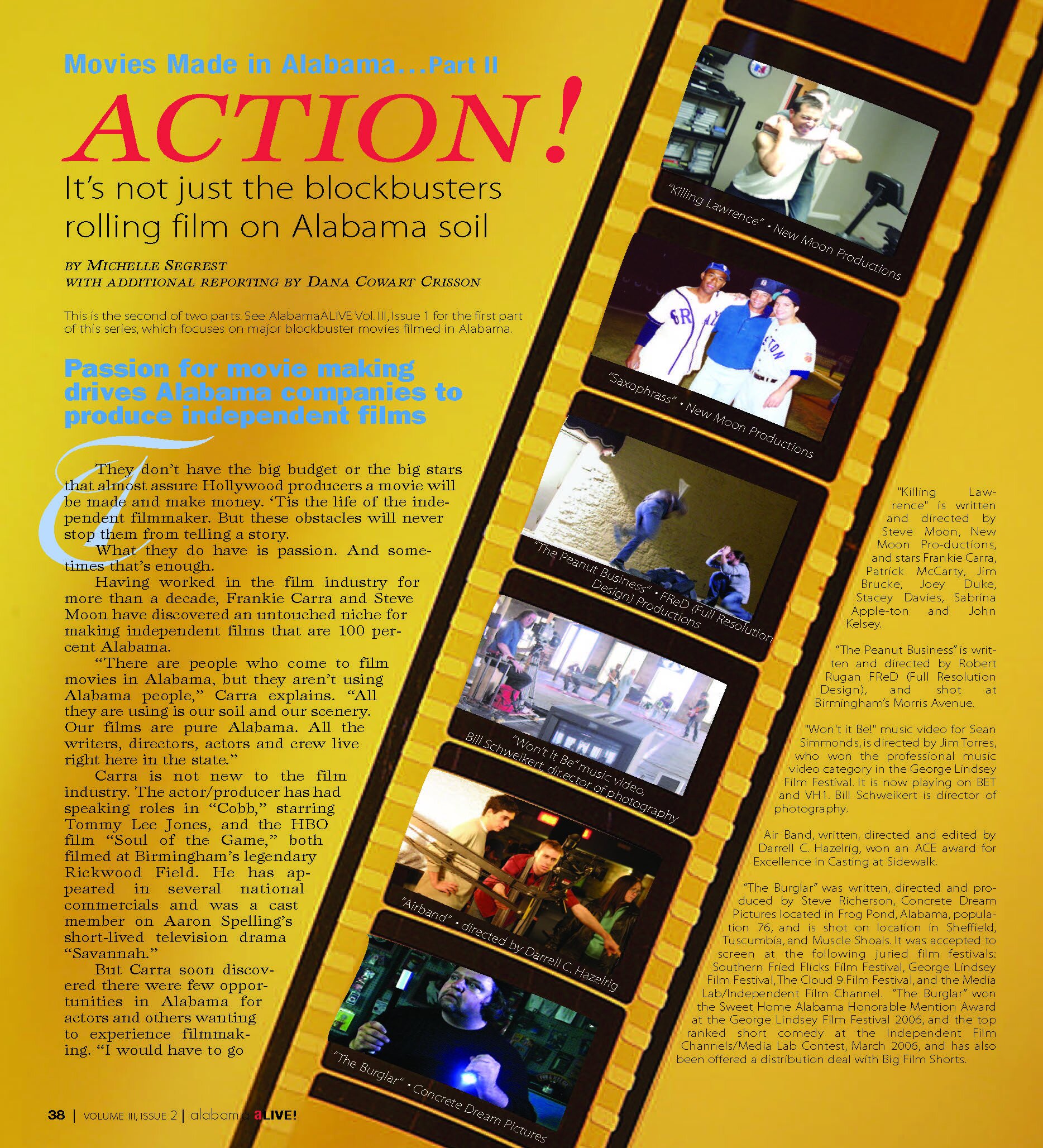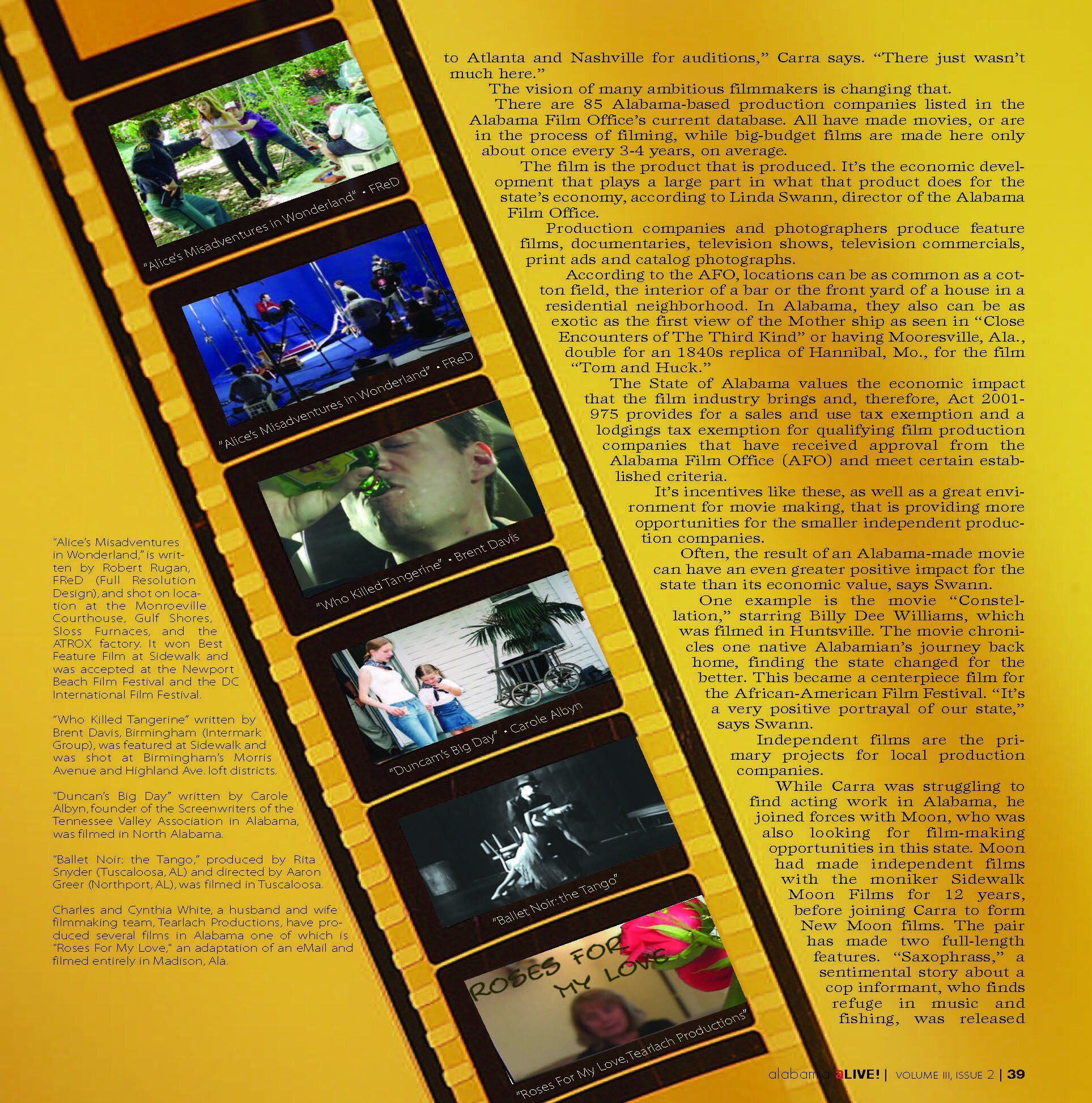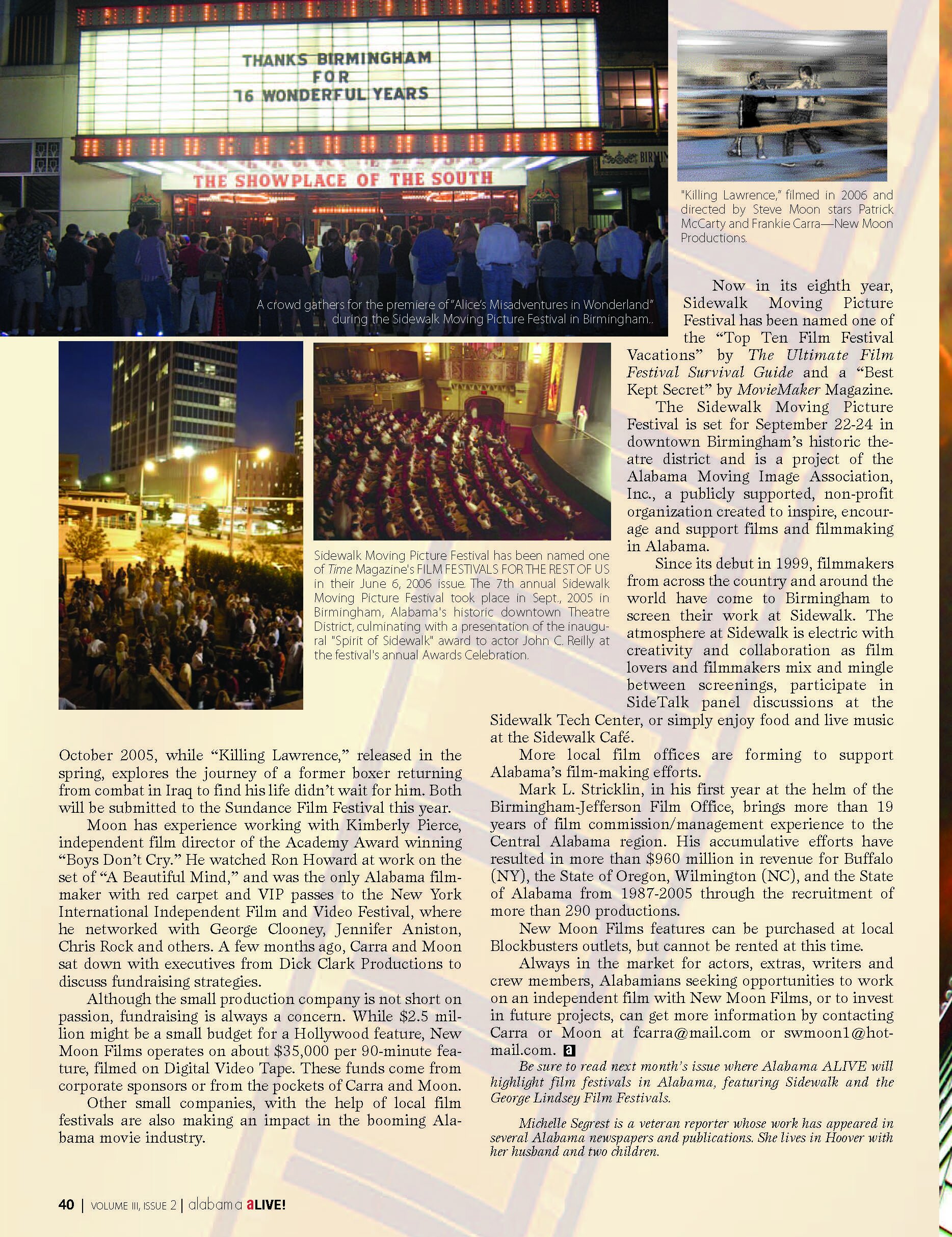Independent Movies Made in Alabama
/It’s not just the blockbusters rolling film in Alabama. The State of Alabama values the economic impact that the film industry brings and, therefore, Act 2001-975 provides for a sales and use tax exemption and a lodgings tax exemption for qualifying film production companies that have received approval from the Alabama Film Office (AFO) and meet certain established criteria. It’s incentives like these, as well as a great environment for movie making, that is providing more opportunities for the smaller independent production companies.



By Michelle Garland Segrest
Originally published in Alabama aLIVE! | Vol. III, Issue 2, 2005
They don’t have the big budget or the big stars that almost assure Hollywood producers a movie will be made and make money. ‘Tis the life of the independent filmmaker. But these obstacles will never stop them from telling a story.
What they do have is passion. And sometimes that’s enough.
Having worked in the film industry for more than a decade, Frankie Carra and Steve Moon have discovered an untouched niche for making independent films that are 100 percent Alabama.
“There are people who come to film movies in Alabama, but they aren’t using Alabama people,” Carra explains. “All they are using is our soil and our scenery. Our films are pure Alabama. All the writers, directors, actors and crew live right here in the state.”
Carra is not new to the film industry. The actor/producer has had speaking roles in “Cobb,” starring Tommy Lee Jones, and the HBO film “Soul of the Game,” both filmed at Birmingham’s legendary Rickwood Field. He has appeared in several national commercials and was a cast member on Aaron Spelling’s short-lived television drama “Savannah.”
But Carra soon discovered there were few opportunities in Alabama for actors and others wanting to experience filmmaking. “I would have to go to Atlanta and Nashville for auditions,” Carra says. “There just wasn’t much here.”
The vision of many ambitious filmmakers is changing that.
How Independent Movies are Made in Alabama
There are 85 Alabama-based production companies listed in the Alabama Film Office’s current database. All have made movies, or are in the process of filming, while big-budget films are made here only about once every 3-4 years, on average.
The film is the product that is produced. It’s the economic development that plays a large part in what that product does for the state’s economy, according to Linda Swann, director of the Alabama Film Office.
Production companies and photographers produce feature films, documentaries, television shows, television commercials, print ads and catalog photographs.
According to the AFO, locations can be as common as a cotton field, the interior of a bar or the front yard of a house in a residential neighborhood. In Alabama, they also can be as exotic as the first view of the Mother ship as seen in “Close Encounters of The Third Kind” or having Mooresville, Ala., double for an 1840s replica of Hannibal, Mo., for the film “Tom and Huck.”
The State of Alabama values the economic impact that the film industry brings and, therefore, Act 2001-975 provides for a sales and use tax exemption and a lodgings tax exemption for qualifying film production companies that have received approval from the Alabama Film Office (AFO) and meet certain established criteria.
It’s incentives like these, as well as a great environment for movie making, that is providing more opportunities for the smaller independent production companies.
How Alabama Movies Impact the Economy
Often, the result of an Alabama-made movie can have an even greater positive impact for the state than its economic value, says Swann.
One example is the movie “Constellation,” starring Billy Dee Williams, which was filmed in Huntsville. The movie chronicles one native Alabamian’s journey back home, finding the state changed for the better. This became a centerpiece film for the African-American Film Festival. “It’s a very positive portrayal of our state,” says Swann.
Independent films are the primary projects for local production companies.
While Carra was struggling to find acting work in Alabama, he joined forces with Moon, who was also looking for film-making opportunities in this state. Moon had made independent films with the moniker Sidewalk Moon Films for 12 years, before joining Carra to form New Moon films. The pair has made two full-length features. “Saxophrass,” a sentimental story about a cop informant, who finds refuge in music and fishing, was released October 2005, while “Killing Lawrence,” released in the spring, explores the journey of a former boxer returning from combat in Iraq to find his life didn’t wait for him. Both will be submitted to the Sundance Film Festival this year.
Moon has experience working with Kimberly Pierce, independent film director of the Academy Award winning “Boys Don’t Cry.” He watched Ron Howard at work on the set of “A Beautiful Mind,” and was the only Alabama filmmaker with red carpet and VIP passes to the New York International Independent Film and Video Festival, where he networked with George Clooney, Jennifer Aniston, Chris Rock and others. A few months ago, Carra and Moon sat down with executives from Dick Clark Productions to discuss fundraising strategies.
How Independent Film Makers Raise Funds in Alabama
Although the small production company is not short on passion, fundraising is always a concern. While $2.5 million might be a small budget for a Hollywood feature, New Moon Films operates on about $35,000 per 90-minute feature, filmed on Digital Video Tape. These funds come from corporate sponsors or from the pockets of Carra and Moon.
Other small companies, with the help of local film festivals are also making an impact in the booming Alabama movie industry.
Now in its eighth year, Sidewalk Moving Picture Festival has been named one of the “Top Ten Film Festival Vacations” by The Ultimate Film Festival Survival Guide and a “Best Kept Secret” by MovieMaker Magazine.
The Sidewalk Moving Picture Festival is set for September 22-24 in downtown Birmingham’s historic theatre district and is a project of the Alabama Moving Image Association, Inc., a publicly supported, non-profit organization created to inspire, encourage and support films and filmmaking in Alabama.
Since its debut in 1999, filmmakers from across the country and around the world have come to Birmingham to screen their work at Sidewalk. The atmosphere at Sidewalk is electric with creativity and collaboration as film lovers and filmmakers mix and mingle between screenings, participate in SideTalk panel discussions at the Sidewalk Tech Center, or simply enjoy food and live music at the Sidewalk Café.
More local film offices are forming to support Alabama’s film-making efforts.
Mark L. Stricklin, in his first year at the helm of the Birmingham-Jefferson Film Office, brings more than 19 years of film commission/management experience to the Central Alabama region. His accumulative efforts have resulted in more than $960 million in revenue for Buffalo (NY), the State of Oregon, Wilmington (NC), and the State of Alabama from 1987-2005 through the recruitment of more than 290 productions.
Always in the market for actors, extras, writers and crew members, Alabamians seeking opportunities to work on an independent film with New Moon Films, or to invest in future projects, can get more information by contacting Carra or Moon at fcarra@mail.com or swmoon1@hotmail.com.
Michelle Segrest is a veteran reporter whose work has appeared in several Alabama newspapers and publications.



























